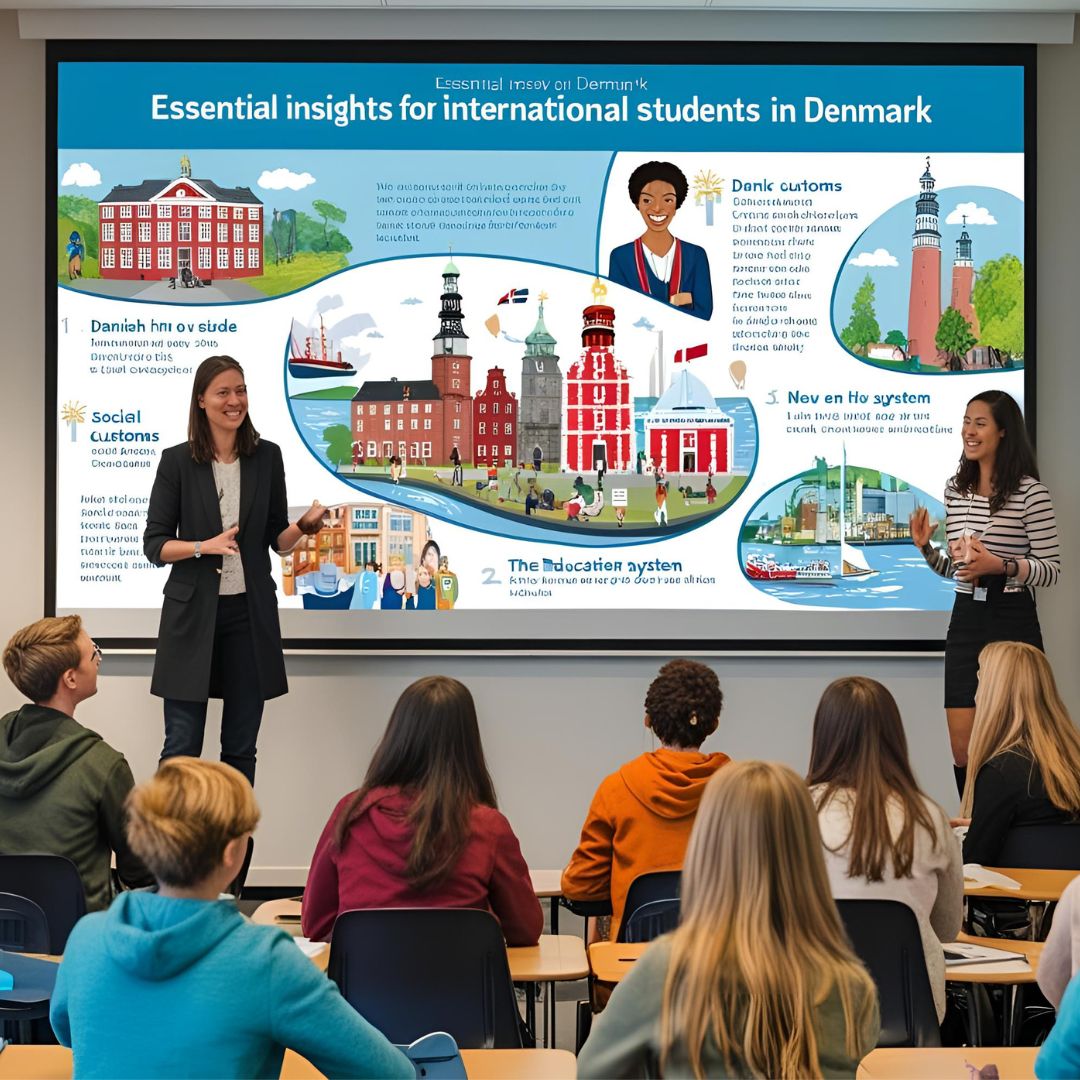Introduction
So, you’re thinking about studying in Denmark? Great choice! Denmark is one of the most innovative, student-friendly countries in the world. Whether you’re dreaming of biking through cobbled streets, sipping coffee in Copenhagen, or immersing yourself in world-class education, Denmark has it all. This guide is your passport to everything you need to know as an international student.
Top Reasons to Study in Denmark
World-Class Education
Denmark’s education system is globally renowned. Danish universities are consistently ranked among the best, focusing on critical thinking, collaboration, and creativity—skills that matter in the real world.
Innovation and Research Opportunities
Want to be part of cutting-edge research? Denmark invests heavily in R&D. Universities often partner with industries, giving students hands-on opportunities to work on real-world problems.
Safe and Inclusive Environment
Denmark is one of the safest countries on the planet. It’s also super inclusive and socially progressive, making it a welcoming home for students from all over the globe.
Understanding the Danish Education System
Higher Education Institutions
There are three main types:
- Universities
- University Colleges
- Academies of Professional Higher Education
Each caters to different academic and career goals.
Types of Degrees Offered
- Bachelor’s (usually 3 years)
- Master’s (2 years)
- PhD (3 years)
There are also short-cycle degrees and diploma courses.
Language of Instruction
While Danish is the national language, over 700 programs are taught in English. Perfect for international students!
Choosing the Right University
Top Universities in Denmark
- University of Copenhagen
- Aarhus University
- Technical University of Denmark (DTU)
- Copenhagen Business School (CBS)
- Aalborg University
Factors to Consider
- Course structure and specialization
- Campus location and facilities
- International student support
Admission Process for International Students
Entry Requirements
- Completed secondary education
- Proof of English proficiency (IELTS, TOEFL)
- Specific program requirements (e.g., portfolios or interviews)
How to Apply
- Use the optagelse.dk portal for undergraduate programs
- Apply directly to the university for postgraduate programs
Important Deadlines
- March 15 for September intake (Bachelor’s)
- Varies for Master’s programs (check individual university websites)
Cost of Studying in Denmark
Tuition Fees
- Free for EU/EEA & Swiss students
- Non-EU/EEA students: €6,000–€16,000 per year
Living Expenses
- Around €1,000–€1,500/month
- Includes rent, food, transport, books, and leisure
Budgeting Tips
- Cook at home
- Buy a used bicycle
- Use student discounts
Scholarships and Financial Aid
Government Scholarships
Denmark offers scholarships through programs like the Danish Government Scholarship for non-EU/EEA students.
University-Specific Scholarships
Some universities provide merit-based or need-based aid.
External Funding Sources
Check platforms like Erasmus+, Fulbright, or private foundations.
Student Visa Requirements
How to Apply
Apply for a residence permit through the Danish Agency for International Recruitment and Integration (SIRI).
Required Documents
- Acceptance letter
- Proof of funds
- Passport
- Health insurance
Processing Time
Around 60 days—apply early!
Accommodation Options in Denmark
Student Housing
Affordable and often located near campuses. Apply early—these fill up fast!
Private Rentals
More freedom but can be pricier. Websites like BoligPortal and Lejebolig are great resources.
Tips
- Watch out for scams
- Consider sharing a flat
- Use your university’s housing office
Working While Studying
Rules
- Non-EU/EEA students: up to 20 hours/week during semesters, full-time during holidays
Job Types
- Café/bar jobs
- Internships
- Tutoring or university assistantships
Balancing Act
Time management is key—don’t let work mess with your grades.
Life in Denmark
Culture and Lifestyle
Think “hygge” – the Danish concept of cozy comfort. People are polite, punctual, and very environmentally conscious.
Transportation
- Biking is the king!
- Public transport is reliable but a bit pricey
- Student discounts available
Health and Safety
- Free healthcare for students with residence permits
- Super low crime rate
Learning Danish – Is It Necessary?
Language Courses
Many universities offer free or discounted Danish classes.
Benefits
While English is widely spoken, learning Danish helps you integrate, make friends, and opens up job opportunities.
After Graduation Opportunities
Stay Back Options
You can stay in Denmark for up to 2 years after graduation to look for a job.
Job Market
Strong in tech, engineering, life sciences, and sustainability.
Work Visa
After finding a job, apply for a work permit under the Fast-Track Scheme or Positive List.
Common Challenges Faced by International Students
Culture Shock
Danes are reserved, but friendly once you get to know them.
Weather
Grey skies and rain—pack a good jacket and stay positive!
Finances
Living costs are high, so plan ahead.
Tips for a Smooth Study Abroad Experience
Join Student Organizations
Great for making friends and building your network.
Use Support Services
From counseling to career guidance, your university has you covered.
Network
Danes value connections—go to events, meetups, and get social.
Conclusion
Studying in Denmark is more than just hitting the books—it’s about embracing a lifestyle that values innovation, equality, and quality of life. If you’re looking for a safe, welcoming, and intellectually stimulating place to study, Denmark might just be your perfect fit. Pack your bags, keep an open mind, and get ready for the adventure of a lifetime!
FAQs
1. Is Denmark expensive for international students?
Yes, it can be, especially for non-EU students. However, with careful budgeting and scholarships, it’s manageable.
2. Can I work full-time as a student in Denmark?
Only during scheduled holidays. Otherwise, you’re limited to 20 hours per week if you’re a non-EU/EEA student.
3. Do I need to know Danish to study in Denmark?
Nope! Many programs are in English, but learning Danish is helpful for social and professional integration.
4. What is the quality of life like for students?
Very high—excellent public services, safety, and a laid-back lifestyle make Denmark a great student destination.
5. How can I extend my stay after graduation?
Apply for a job-seeking permit (up to 2 years) and then a work visa once employed.


Leave a Reply